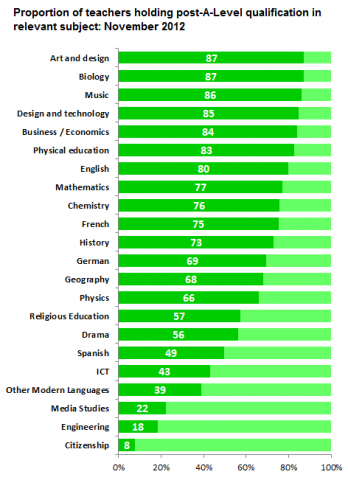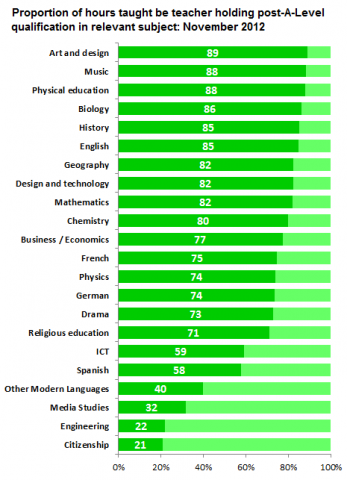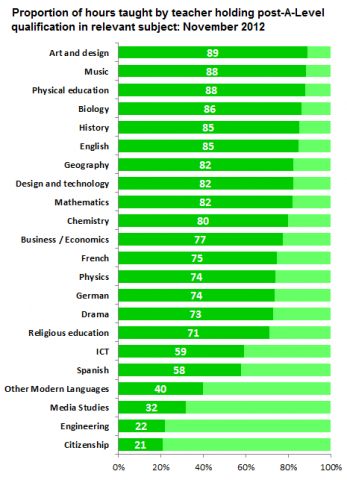Are teachers underqualified?
"Thousands of teachers are giving lessons in English, maths and science when they do not have a relevant degree, official figures show. Almost a quarter of secondary school maths teachers (about 7,500) and more than a third of physics teachers (approximately 2,000) do not have a relevant degree-level qualification."
Last week we found out that a third of children entering school were unable to communicate. This week statistics from the Department for Education (DfE) have raised concerns about whether certain secondary school teachers are unequipped to teach their pupils.

Join 72,953 people who trust us to check the facts
Sign up to get weekly updates on politics, immigration, health and more.
Subscribe to weekly email newsletters from Full Fact for updates on politics, immigration, health and more. Our fact checks are free to read but not to produce, so you will also get occasional emails about fundraising and other ways you can help. You can unsubscribe at any time. For more information about how we use your data see our Privacy Policy.
According to the DfE's latest statistical release, 23% of maths teachers don't hold any relevant post A-level qualifications. As we can see from the chart on the right, that figure goes up to 34% for physics teachers, and well over 50% for Spanish and other foreign language teachers.
(The data is taken from Table 13 of the DfE's statistical release).
But fear not, this doesn't meant our schools are falling apart.
Maths and physics: the trend over time
The trend has been fairly consistent in the past three years. In 2010 26% of maths teachers and 31% of physics teachers didn't hold a degree relevant to their subject, while in 2011 the figures were respectively 27% and 33.7%. Slightly more teachers hold relevant qualifications now than in the past two years, so these numbers aren't a new revelation.
Foreign languages
Meanwhile, when it comes to the shortage of graduates among foreign language teachers, there isn't necessarily cause for concern.
Alan Smithers, director of the Centre for Education and Employment Research at the University of Buckingham, points out in the Times that "In languages, where we are very short of graduates, it is hopefully the case that the teachers are native speakers and would not necessarily have a degree in England in the subject."
What counts as a relevant subject?
There are 857,530 secondary school teachers in England, and the majority (96%) of them hold qualifications at degree level or higher, though of course this doesn't mean they all hold a relevant degree.

The DfE's statistical report also included a number of subject mapping tables, which offer an interesting insight into what counts as a 'relevant subject'. If you teach physics, degree subjects such as Material Science, Physics and Astronomy will be considered relevant, but other science-related degrees won't. For maths teachers, Mathematics, Operational Research and Statistics will be considered relevant but, for example, Physics and Economics wouldn't.
Proportion of hours taught by qualified teachers

If we look at the proportion of hours taught by teachers, we'll find that across all subjects the ones who hold a relevant qualification teach a larger proportion of school hours than the ones who don't. For "unqualified" teachers of Physics and Mathematics teach respectively 26% and 18% of all teaching hours.
Conclusion
The figures cited by the Times are sound, but there are a number of caveats which we might want to bear in mind. For one, the reason why over 20% of maths and physics teachers don't hold a degree relevant to their subject is that a fair number of subjects which in other contexts would be considered relevant, such Economics and other science degrees, aren't taken into account. The input "unqualified" teachers have is lowered when we consider the proportion of hours they teach. It's also important to note that overall 96% of teachers do hold a degree.